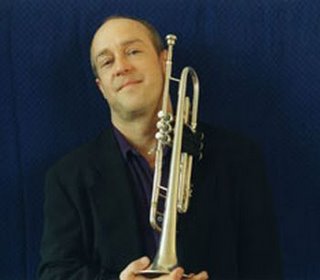Dave Douglas joins the Blogosphere
 Trumpeter and leader of a million ensembles (and that's not much of an overstatement) Dave Douglas has not only started his own record label, Greenleaf Records, but also his own jazz blog. Dave's music is always interesting, some of it I like a lot, and even the stuff I don't really enjoy that much is worth a listen, because he always has something to say. And speaking of things to say, here's Dave's comments on his musical vision, which I think sheds some light on where he's coming from - here's an excerpt:
Trumpeter and leader of a million ensembles (and that's not much of an overstatement) Dave Douglas has not only started his own record label, Greenleaf Records, but also his own jazz blog. Dave's music is always interesting, some of it I like a lot, and even the stuff I don't really enjoy that much is worth a listen, because he always has something to say. And speaking of things to say, here's Dave's comments on his musical vision, which I think sheds some light on where he's coming from - here's an excerpt:Musical collisions attract me as a composer because they challenge my assumptions and any easily accepted sense of what music and humans can be. Both music and humans surpass comprehension, but creating new music puts one at the edge of the mystery. When different systems or different languages interact, everyone benefits. It's how culture perpetuates and refreshes itself.I'm not a big fan of the "jazz wars" thing, which most often pits Dave Douglas and his followers against Wynton Marsalis and his followers, with both sides trying to tell us how the other is ruining jazz. (I think there's room for both and all areas in between - but I think it continues mainly because both camps want to be the "underdog" fighting for their beloved music against these artistic philistines.)The growth is not always easy. I tend to see the jazz wars as part of the larger culture war about what we should believe, what the past means, and how we outgrow stereotypes. Not to overdramatize it -- there are much more critical battles going on in the reality-based world of war and fundamentalism. But if culture is a microcosm we can watch some of those same tendencies in reaction to change and progress.
What I really want to talk about are specific musical observations following up on my 12/16 post. These are some things I've noticed in the music, and they are things I don't see talked about very often.
One of the biggest obstacles that arises as soon as musicians from different disciplines play together is dynamics. How loud is loud? How loud is too loud? And what do we do about it? This is a more subtle distinction than it seems -- classical players depend on a score and an ensemble sense to guide them, jazz players tend to play as loud as the drummer, electric musicians play as loud as they have to to get the sound they're looking for. The presumption of how loud to play is not quickly re-established. The conception of volume and its meaning is a constant and persistent concern.
However, regardless of THAT debate, I think Dave's comments are quite interesting, and help explain his constant search for new musical contexts. Sometimes I think he can be a little too ambitious, as he does so many projects and leads so many different ensembles, that he might be able to benefit from a little more focus at times.
Also, I would say that the interaction of "different systems or different languages" is ONE WAY, as opposed to the ONLY way that "culture perpetuates and refreshes itself." I'm not sure if he was implying that it was the exclusive path to artistic innovation, but regardless, it's an interesting area for thought. Certainly much of jazz history can be explained by such a theory, but I'd balk at any attempt to make that theory explain every new artistic development in jazz, let alone the larger artistic world.


3 Comments:
Interesting post. I didn't know Mr Douglas was blogging until today!
The internet (blogs, myspace, podcasts) is giving this generation of musicians and music fans ways to communicate in an intimate way that has never been possible before. DD Jackson's regular podcasts are worth checking out too. We never got this sort of chance to get a close insight into Miles or Duke's creative process or thoughts on musical performance (Miles wouldn't have blogged anyway, I'm sure).
Maybe this sort of public exposition of creative motivations eliminates some of the mystery that surrounds great musicians...? Or perhaps it exposes their music to a wider audience. Blogging by musicians probably cuts both ways.
Thanks for the heads up! I've been a Douglas fan for quite a few years now and look forward to what he has to post. Take note that The Bad Plus have a blog too, which I think is accessible through their website.
Regarding musicians and blogs, I think its a great grassroots form of exposure that bypasses the record companies. How great it would be if you could purchase an album directly through the artist's website via download and have their name spread through festivals and word of mouth, rather than more commercial means.
"Maybe this sort of public exposition of creative motivations eliminates some of the mystery that surrounds great musicians...?"
The mystery is mostly bullshit, IMO. Darcy James Argue posted about how Maria Schneider helped him out on a composition of his, and takes a bit out of the mythos (you'll have to trawl the archives for that post).
The jazz blogosphere seems to be finally waking up, although the pop and classical ones are still far ahead.
Post a Comment
<< Home